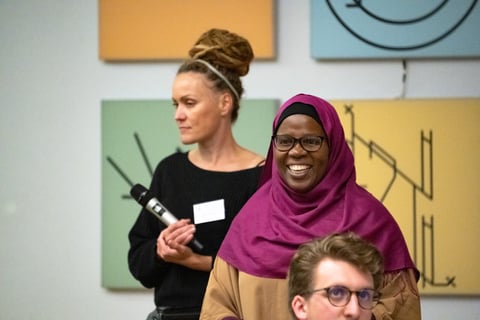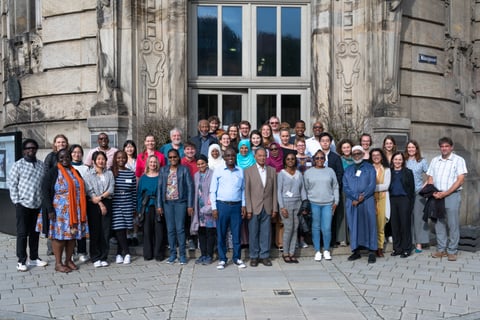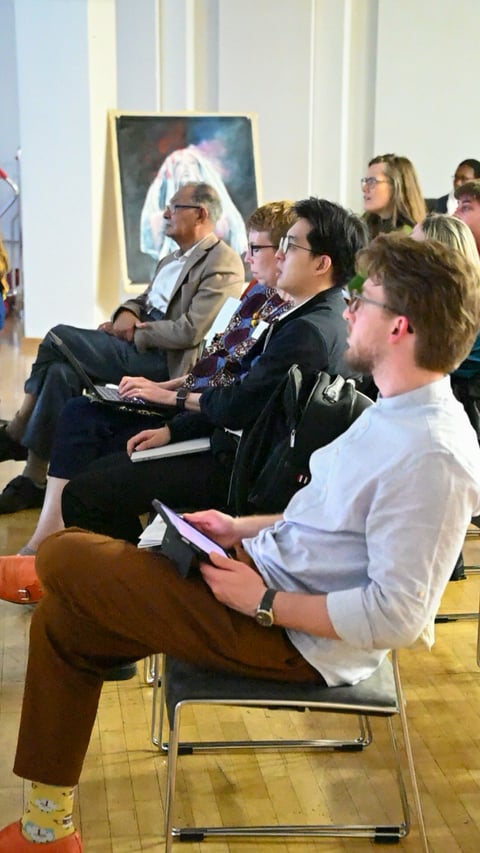News
Report- 35th Swahili Colloquium 2023: Mashujaa! ReCONFIGuring Swahili Studies
Report- 35th Swahili Colloquium 2023:
Mashujaa! ReCONFIGuring Swahili Studies
From the 19th-21st of May, 2023, The University of Bayreuth held the 35th edition of the Swahili Colloquium at Iwalewehaus in a hybrid format for the first time ever. The Colloquium is a well-established forum hosted annually at Bayreuth University, which brings together a large international community of scholars and researchers from different disciplines.
The global pandemic meant that the previous years’ editions had been held online with a reduced programme; but this year saw a return to a full three-day programme - featuring two roundtables, 12 panels consisting of 38 presentations, two artistic performances, and several book launches. Scholars and researchers from over 30 different countries were in attendance. The multidisciplinary approach - including contributions from linguistics and literary studies to anthropology and history - particularly accounts for the appeal of the colloquium.
This year, the colloquium was lucky to have three visiting artists present- Yvonne Odhiambo Owuor (Kenya), Jeanluc Raharimanana (Madagascar) and Nash MC (Tanzania). On Friday night, we sampled some of Nash MC’s Swahili Hip-hop/Rap. On Saturday night, we had a musical book reading; Yvonne Adhiambo Owour read sections from her novel Dragonfly Sea accompanied by and in conversation with the music and songs of JeanLuc Raharimanana and his traditional Malagasay instrument. A small exhibition with paintings by students of the Mahatma Gandhi Institute of Arts in Mauritius which created artworks in relation to the Dragonfly Sea. The audience also heard from the winners of last year’s Mabati prize for literature, with the poets and authors joining us digitally to share and read from their work. Book launches, like that the a poetry anthology by Mahmoud Mau, edited by Annachiara Raia and Clarissa Vierke, complemented the programme.
This year’s overarching theme was “Mashujaa! ReCONFIGuring Swahili Studies”. The aim was to centre discussion and critical inquiry of the discipline(s) and foundations of Swahili Studies – in particular, by bringing key figures and pioneers in the study of Swahili language, literature, history, and culture. By zeroing in on life stories of key figures of several spheres of intellectual, material, cultural, social, and symbolic production in East Africa, the aim was not only to expand the critical examination of Swahili Studies - but also to make an impact in African Studies more broadly, by opening up ways of breaking through the (meta)physical empire and breaking ground for new archives and canons
This theme was evident throughout the weekend, but nowhere more so than the final panel on the first day entitled “Reconfiguring Swahili Studies”. The first half of the panel was entitled “More than three Swahili Woman”, which aimed to demonstrate how “matrifocal knowledge practices create communities of practice (Wissensgemeinschaft)” with examples from the lives of three “Swahili heroins”. This lead onto the second part of the panel – a roundtable entitled “Reconfiguring Swahili Studies: Is ‘uswahili’ at the heart of the process?”, which put forth that a critical rethinking of Swahili Studies has to begin with an understanding of Uswahili in its pluralistic global. The round tables sparked important discussions about the positionality and relationality within the multiple Swahili worlds and imaginaries.




